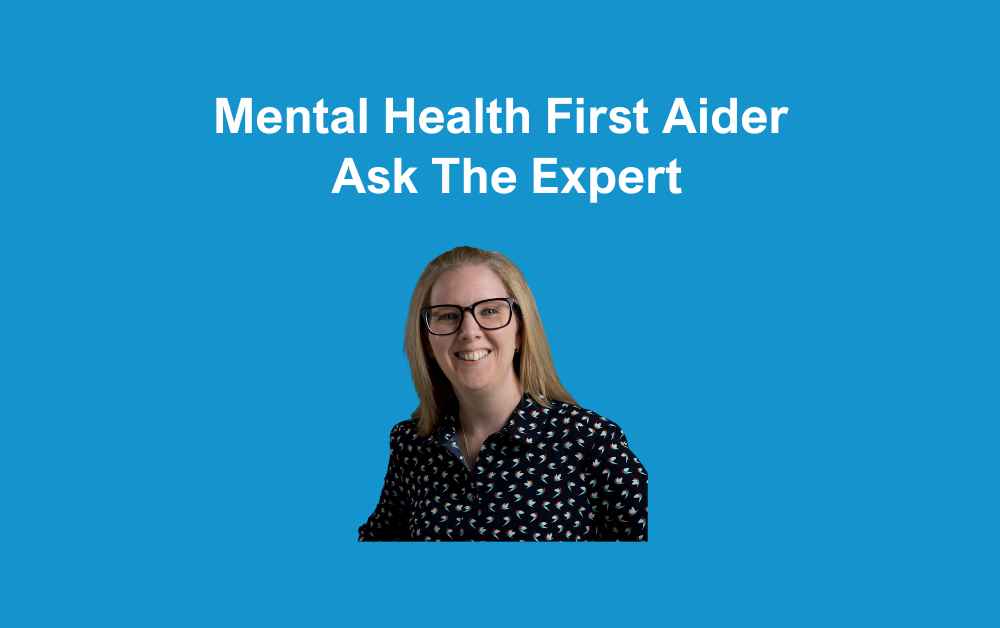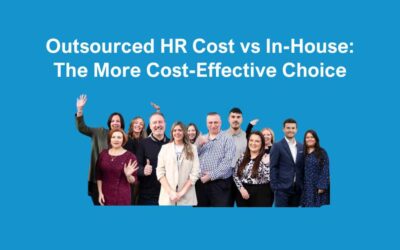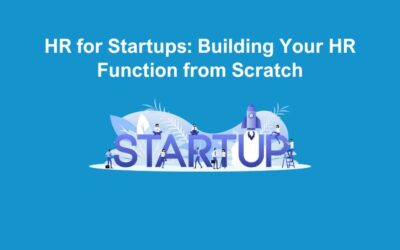Many of our HR experts have completed their FAA Mental Health First Aider training. The SCQF level 6 qualification course looks at mental health conditions and gives insight in to the wide range of therapy and support available. When sharing this news to our client, many people have asked what is a mental health first aider?
To help answer this question, we spoke with one of our HR experts, Claire, who also shared her experience as a MHFA. She explains why this role is so valuable and highlights the importance of employers introducing it into the workplace.
What is a Mental Health First Aider?
A MHFA is a trained individual who is in charge of supporting employees when they are struggling with their mental health. They are equipped to recognise the early signs of mental ill health and offer initial help through active listening and compassionate support.
As part of their training, MHFAs learn to:
- Understand what mental health first aid is
- Provide practical advice and support
- Start conversations around mental health with confidence
- Identify common mental health conditions
- Understand the impact of drugs and alcohol on mental wellbeing
- Apply the Mental Health First Aid action plan
- Promote mental health awareness in the workplace
- First Aid for Mental Health in the workplace
Most importantly, they can point staff in the right direction for appropriate support. A mental Health First Aider is also trained to deal with emergencies such as thoughts of suicide and psychosis. Although a MHFA has the skills to support people in need, it’s important to remember they are not therapists or psychiatrists. However, they can help source this support. Unlike your normal “First aiders” the Mental Health First Aider is not there to provide physical care, but support and sign posting.
How do you support colleagues or clients who may be struggling with their mental health?
The best way that you can support someone who you know is struggling with their mental health is allowing them the space to speak openly and without judgement. Open listening and assuring them you are there to help and providing them with some contacts or even support to attend appointments always helps. I have found myself on a number of occasions, on the back of a brief phone call, doing some research and sharing referrals to organisations such as “Andy’s Man Club”.
Why is having a Mental Health First Aider in the workplace so important?
For some people, work is a respite from all other things in their life. It is the place where people can speak freely without the fear of worrying others such as family. Having a mental health first aider is so important because 1, it shows that the business takes mental health seriously, and 2 it could be the one point of contact that someone uses in the event of crisis or potential crises.
What are some of the common signs someone might be experiencing mental health issues?
Nonphysical common signs include:
- a change in personality
- being not quite themselves
- more emotional than they would usually be
- withdrawn
- quick to anger
- or even completely disengaged, distracted and in another world.
Physical signs may be:
- increased absence and lateness levels
- changes in performance and output
- weight loss, unkept or even on the opposite end
- present as being under the influence or substances, or hungover as substances can be used to medicate Mental Health issues.
What kind of training did you go through to become a Mental Health First Aider?
I attended a three day workshop. It was one of the most interesting and informative training sessions I have ever attended. People and how their brains work are fascinating, and I was so interested to hear from other people and their own stories, along with the having the realisation that things may not always be as they seem with people.
How do you create a safe and supportive environment for someone to open up?
I believe that this starts with the culture of the organisation. Where people are encouraged to speak and feel supported. Having initiatives such as Employee Assistance Programmes (EAP) can also enhance that image as it demonstrates that the employer wishes to help and support. Having a key person with Mental Health First Aider training does help, especially when that person is a respected and trusted member of the team. A place where people can have the time to take a breath also helps, that can be a canteen or even an area outside where people can chat in private or even just stop to take a breath. Supportive absence polices also help, again it gives the employee the confidence to be honest and open about their absences.
Are there any misconceptions about mental health that you often come across in your role?
Certainly, some employers automatically default to the person not being truthful in their admission of mental health issues. They are sometimes viewed as self-inflicted and “not that bad” or that the employer doesn’t see why they have issues as they have x,y,z going good in their life. But on the opposite scale, we also get employers who believe that it is their responsibility to ensure the person is seeking and getting help which is not quite the case.
The other side of that is that some employers believe nothing can be done when someone’s absences are directly related to Mental Health but are having an impact on the business. There are processes that can be put in place such as monitoring, recording absences through return to works and also the engagement of occupational health specialists that will assist in the management of these cases.
What advice would you give to someone who wants to support a colleague but isn’t sure how?
I would say initially, ask them how they are, start up a conversation over a cup of coffee. You can even look into the different organisations that provide Mental Health support or speak with your mental health first aider at work to establish how best to approach the person. Where you are seriously concerned about the person that they may hurt themselves or others, I would suggest seeking assistance from a GP or emergency services.
How do you look after your own mental health while supporting others?
I take the time to decompress and get out in the fresh air, nature is a wonderful tool. In HR you are exposed to a lot of things including the personal lives of people which can be a challenge at times, where it comes to addressing Mental Health issues which can at times be relevant to your own experiences.
What impact have you seen Mental Health First Aider have in the workplace?
I’ve seen it have a genuinely positive impact. In the instances I’ve witnessed, it’s led to meaningful support being provided when needed, creating a better experience for those involved. It has also helped reduce absences at times, as employees feel more comfortable speaking openly and know there’s a support system in place at work.
What would you say to a business that hasn’t yet invested in mental health training?
I would say that your business should take the time to consider the benefits of having a Mental health first aider on site, especially in particular industries where mental health and suicide rates are higher. We are seeing an increasing number of people and young people being more open about their mental health experiences and as result seeking assistance. If you have a MHFA on site, not only does it enhance that you are looking after your staff, but it could also have the potential to save a life.
How The HR Booth Can Help
At The HR Booth, we understand the critical role mental health plays in the workplace. That’s why many of our HR professionals have completed the SCQF Level 6 First Aid for Mental Health training, giving us the knowledge and tools to provide informed and practical guidance to our clients.
We regularly advise businesses on how to build a mentally healthy working environment and support their teams effectively. With mental health now the leading cause of workplace absence—and with recent reports estimating that absence costs UK employers over £14 billion annually—it’s never been more important for businesses to take proactive steps.
By investing in mental health training, our team can:
-
Help employers recognise early signs of mental ill health in the workplace
-
Guide organisations in introducing Mental Health First Aiders and relevant policies
-
Support with drafting or updating wellbeing strategies and absence management procedures
-
Offer practical support to line managers and HR teams navigating sensitive mental health matters
-
Share real-life insights from our own trained MHFA’s, helping to bridge the gap between theory and practice
Already, we’ve seen the benefits of this training in action—whether it’s providing support to individuals, assisting with referrals, or simply being a listening ear when it matters most. Our team has been able to offer genuine, informed help to both employers and employees across a variety of industries.
Contact Us
If you would like to find out more about what is a mental health first aider and how our team can help, contact us now.







